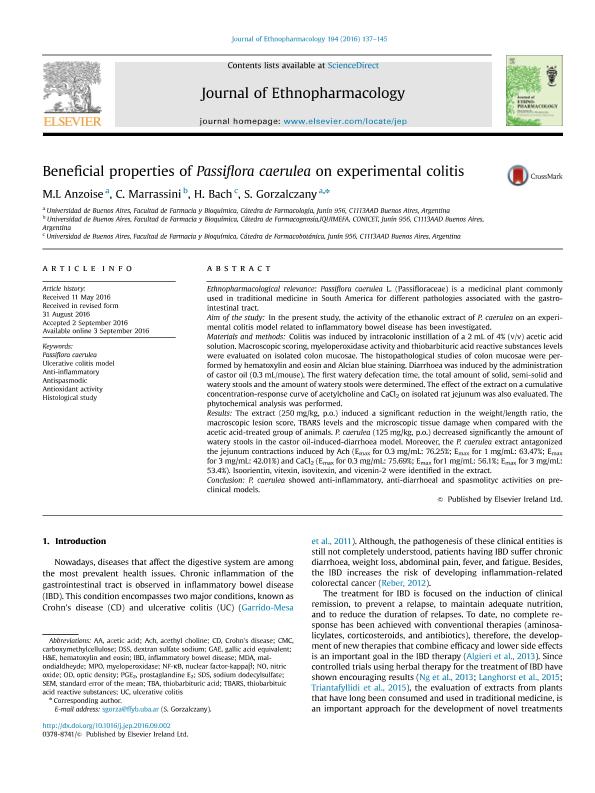Artículo
Beneficial properties of Passiflora caerulea on experimental colitis
Fecha de publicación:
12/2016
Editorial:
Elsevier Ireland
Revista:
Journal of Ethnopharmacology
ISSN:
0378-8741
Idioma:
Inglés
Tipo de recurso:
Artículo publicado
Clasificación temática:
Resumen
ETHNOPHARMACOLOGICAL RELEVANCE: Passiflora caerulea L. (Passifloraceae) is a medicinal plant commonly used in traditional medicine in South America for different pathologies associated with the gastrointestinal tract. AIM OF THE STUDY: In the present study, the activity of the ethanolic extract of P. caerulea on an experimental colitis model related to inflammatory bowel disease has been investigated. MATERIALS AND METHODS: Colitis was induced by intracolonic instillation of a 2mL of 4% (v/v) acetic acid solution. Macroscopic scoring, myeloperoxidase activity and thiobarbituric acid reactive substances levels were evaluated on isolated colon mucosae. The histopathological studies of colon mucosae were performed by hematoxylin and eosin and Alcian blue staining. Diarrhoea was induced by the administration of castor oil (0.3mL/mouse). The first watery defecation time, the total amount of solid, semi-solid and watery stools and the amount of watery stools were determined. The effect of the extract on a cumulative concentration-response curve of acetylcholine and CaCl2 on isolated rat jejunum was also evaluated. The phytochemical analysis was performed. RESULTS: The extract (250mg/kg, p.o.) induced a significant reduction in the weight/length ratio, the macroscopic lesion score, TBARS levels and the microscopic tissue damage when compared with the acetic acid-treated group of animals. P. caerulea (125mg/kg, p.o.) decreased significantly the amount of watery stools in the castor oil-induced-diarrhoea model. Moreover, the P. caerulea extract antagonized the jejunum contractions induced by Ach (Emax for 0.3mg/mL: 76.25%; Emax for 1mg/mL: 63.47%; Emax for 3mg/mL: 42.01%) and CaCl2 (Emax for 0.3mg/mL: 75.69%; Emax for1 mg/mL: 56.1%; Emax for 3mg/mL: 53.4%). Isoorientin, vitexin, isovitexin, and vicenin-2 were identified in the extract. CONCLUSION: P. caerulea showed anti-inflammatory, anti-diarrhoeal and spasmolityc activities on preclinical models.
Archivos asociados
Licencia
Identificadores
Colecciones
Articulos(IQUIMEFA)
Articulos de INST.QUIMICA Y METABOLISMO DEL FARMACO (I)
Articulos de INST.QUIMICA Y METABOLISMO DEL FARMACO (I)
Citación
Anzoise, M. L.; Marrassini, Carla; Bach, Hernán Gerónimo; Gorzalczany, Susana Beatriz; Beneficial properties of Passiflora caerulea on experimental colitis; Elsevier Ireland; Journal of Ethnopharmacology; 194; 12-2016; 137-145
Compartir
Altmétricas




